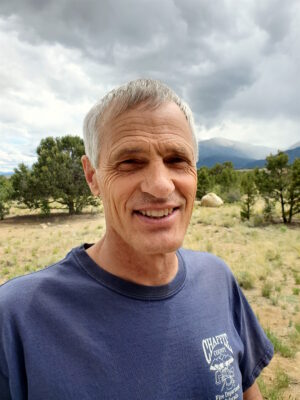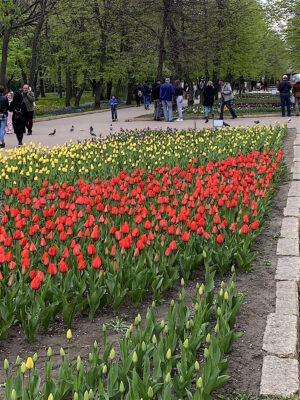It has been an incredibly brutal six months since the Russian invasion of Ukraine began. The world has been witness to the bloodiest conflict on the European continent since the end of World War Two.

Ukrainian parents rushing a hospital with their young children wounded in shelling by Russian forces. Increasing civilian casualties in Russia’s unprovoked war with Ukraine include hundreds of children. Photo Associated Press.
The wanton destruction of cities, towns, and villages, even targeted killings of innocent civilians as well as other war crimes by Russian soldiers directed by dictator Vladimir Putin under the flimsy excuse of having to use a “limited military action to put down a restive populace” he described as “Nazis” has been viewed in horror by the rest of the world.
The support of the U.S. and many of our allies to provide military aid and equipment to President Zelensky and the Ukrainian Army has allowed them to mount a strong defense against the Russian juggernaut.
Nightly news reports have focused on the wrenching conditions under which the civilian populace has had to deal with the onslaught, millions having lost loved ones and homes and often having been displaced within their nation and outside it as refugees.
Many in this country and elsewhere have lent needed financial support through various charitable and government programs as a way of reaching out to those suffering in a way difficult to imagine.
One local Salida doctor, Dr. Richard Ruiter, volunteered his service with a religious organization to provide much-needed medical help to citizens of Ukraine.

Dr. Richard Ruiter works in Emergency Medicine at Heart of the Rockies Regional Health Center and volunteered to go to the war-stricken nation
Ruiter, along with other health professionals and aid workers provide relief efforts around the globe in times of crisis under the auspices of Samaritan’s Purse, a well-known Christian organization. In Ukraine, Ruiter was a member of a large Disaster Assistance Relief Team working in a mobile clinical role for the Ministry of Health focusing on helping the many Ukrainians displaced within the country.
Ruiter has been with Heart of the Rockies Regional Medical Center (HRRMC) since 1999, with Emergency Medicine as his primary specialty, having attended medical school at the University of California San Diego/La Jolla.
In interviews, Ruiter provided first-hand descriptions of the incredible needs of millions of Ukrainians whose lives have been shattered by the widespread destruction of this unwarranted war. He described the unselfish efforts of international aid workers seeking to provide relief, sometimes at the risk of their own safety.
When this reporter first heard of Ruiter’s efforts with Samaritan’s Purse, he was still in the country of Ukraine (he served from the end of April to late May). His family was understandably concerned that not much detailed information be revealed that could potentially put the aid workers in jeopardy if the areas they were working in were published.
Ruiter was humble about his role with Samaritan’s Purse in Ukraine and talked about the impact of being on the ground in the midst of such devastation and profound humanitarian tragedy.
“As a physician, I had the privilege of providing medical care to them,” said Ruiter. “Although most of us are only able to experience the war through the media because we live so far away, I was profoundly affected by being directly involved with the people affected by this tragedy.”
He described how he and other members of Samaritan’s Purse from the U.S. and Canada also provided help in other ways. They have assisted the victims of this war who are dealing with the upending of their lives and food and clothing to basic necessities that no longer were readily available. With medical supplies in short supply, Samaritan’s Purse has provided needed medical supplies to the hospital and other medical facilities still able to operate across the country.
For more than 50 years, Samaritan’s Purse has worked to provide aid to the world’s poor, sick, and suffering. Over that time it has developed effective means of reaching hurting people in countries around the world with food, medicine, and other assistance, as well as providing a Christian religious ministry.
The conditions that Ruiter and the medical team in which he volunteered were treating varied, including medical conditions such as diabetes, cancer, high blood pressure, and other chronic conditions as well as post-traumatic stress syndrome (PTSD). He noted that attempting to treat PTSD while still in a war environment was next to impossible.
Ruiter also commented on what a beautiful, agricultural landscape was to be found in Ukraine, outside of the nearly daily photos of the war’s devastation of the population centers and infrastructure. He included a photograph of a springtime park replete with blooming flowers.

Richard Ruiter took this photo of flowers blooming in a park-like setting, in contrast to the war’s devastation. The impact of this war on Ukrainians can’t be understated.
“Since the beginning of the war, about 15 million people in Ukraine have been displaced from their homes and communities, of which about eight million still remain in Ukraine, with the rest living in other countries,” Ruiter related.
“Our team’s mandate was to provide medical care to many of these internally displaced people in multiple communities. Many of these people had both urgent medical needs along with chronic medical conditions that were being neglected because of the disruption from the war,” he stated.
“Along with medical care, we provided support for them in terms of getting their ongoing medical needs met, and we were able to provide emotional and spiritual support as well.”
He also heard stories of the suffering they endure; homes destroyed, family and friends killed or missing, hiding out in basements for long periods before being able to escape. Allowing them to tell those stories, he said, was a meaningful part of their efforts.
He pointed out that the types of care needed vary greatly and included helping displaced people with chronic medical conditions that aren’t being properly addressed because they have been reduced to being refugees within their own country. Others are war-wounded civilians and fighters with more typical medical conditions needing more intensive medical treatment than can be obtained in chaotic war environments closer to the front lines.
The Samaritan’s Purse website shows the organization assists with various levels of relief after natural and other disasters. Ruiter pointed out that in one week alone while stationed there, the group helped provide more than 300 tons of food to Ukrainians, many of whom had been left without any sources of food and water.
At the conclusion of the effort, Ruiter said his feelings were honestly mixed. Having made friends with many of the residents and members of relief teams working there, they were a combination of sad goodbyes along with a feeling of great accomplishment.
“Part of the joy of doing all this was that this is a team effort and you’re working together as a team and providing medical, physical, and emotional support for these people that are in need,” he concluded.
Such altruism certainly deserves recognition; HRRMC CEO Bob Morasko and HRRMC Board members expressed their pride and appreciation for his unselfish actions.







Recent Comments